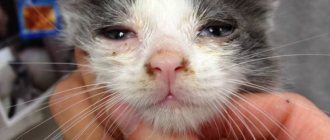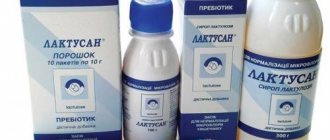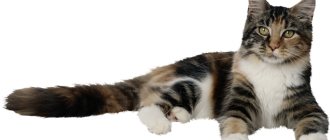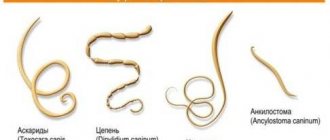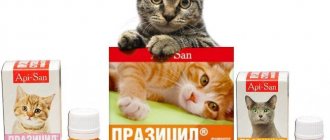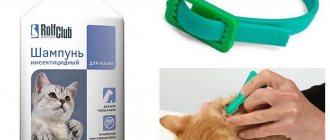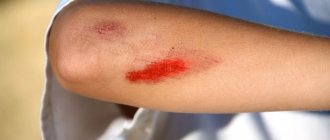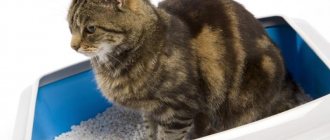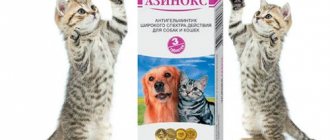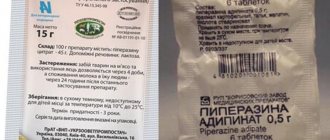Constipation in a domestic cat is a fairly common phenomenon, and every caring owner should know how to identify it and how to deal with it. Retention of feces in the intestines not only causes discomfort to the pet, it is also dangerous, as it threatens intoxication and disruption of the functioning of other organs and systems. In severe cases, constipation can even lead to death, so you need to know how to treat your pet and always have a cat laxative in your medicine cabinet; these include Duphalac, Lactusan, Metamucil, Bisacodyl and some others.
In this article, we write not only about the best laxatives for cats, but also about the causes and symptoms of constipation, as well as when an animal can actually be given medication. We advise you not to skip these sections, because before choosing a medicine, you need to understand what caused the disease. In addition, in some cases, laxatives are contraindicated for a cat, for example, if constipation is caused by stress. But if you only want to know about the best laxatives to give to cats, then refer to the table of contents.
Symptoms of constipation
Normally, a domestic cat defecates daily, usually at about the same time. However, some animals have bowel movements less frequently; this varies from person to person. Loving and caring owners always pay attention to the condition of the cat's litter box in order to promptly clean up after their pet.
If the second day has passed and there is no bowel movement, this is a reason to watch the cat.
In cases where the intestines do not empty, the feces lose water, become hard, and cause significant discomfort to the animal. In addition, excrement is something that the body does not need, it eliminates it, and if bowel movements do not occur, toxins from stagnant feces begin to spread throughout the body.
Constipation can be recognized by the following symptoms:
- the tray is clean for more than two days;
- a cat can dig around for a long time, sit down in the tray, sit for a long time, but without results;
- it is noticeable that the animal is tense, straining, and sometimes makes plaintive sounds;
- The cat sometimes does not go to the litter box, tries to sit somewhere in the corner, but does not leave excrement.
Sometimes, if the cause of constipation is a pathological process, the cat may have additional symptoms. The animal may vomit and vomit; it meows pitifully, trying to communicate unpleasant symptoms and pain. The cat becomes lethargic and inactive. The temperature may rise, the stomach becomes tense, and it is impossible to touch it (cats, even under normal conditions, do not really like touching the stomach, but when sick they can react aggressively to attempts to touch it).
A small amount of stool containing blood or mucus may appear. Sometimes only mucus or blood comes out of the anus. This is a serious symptom that requires immediate contact with a veterinarian.
Possible causes of constipation in cats
The likelihood of developing constipation increases with age: all processes, including intestinal peristalsis, begin to proceed more slowly, and an older animal may begin to have problems with defecation.
In addition, according to veterinary statistics, cats suffer from constipation more often than cats.
The most common causes of constipation are:
- poor nutrition (monotonous food, food from the human table, fasting);
- blockage of the intestinal lumen by a foreign object (most often this is a large lump of swallowed hair, less often - any foreign objects accidentally eaten by the cat and cannot be digested);
- physical inactivity (intestinal motility may be impaired as a result of the cat’s lack of activity and mobility);
- inflammatory diseases of the intestinal tract;
- hypertrophy of the large intestine (megacolon);
- parasitic infestation, large accumulation of worms;
- scars, polyps, neoplasms, inflammatory processes in the rectum;
- oncological diseases;
- pathological processes in the liver, kidneys;
- neurological, psychological or orthopedic problems.
When does a cat need a laxative?
Constipation in cats can occur due to poor diet, gastrointestinal diseases, insufficient fluid intake, and also due to the accumulation of hair in the intestines. In this case, the animal often experiences difficulty defecating, sitting on the tray for a long time. Constipation is indicated by infrequent bowel movements, which may occur no more than 2-3 times a week. In addition, defecation produces a small amount of dry feces. In this case, a laxative is needed to help cleanse the intestines.
If your cat is constipated, you may be able to sit on the litter tray for a long time.
When constipated, a cat may experience pain and meow pitifully on the tray. Droplets of blood can be seen in the stool, which appear as a result of injury to the intestinal mucosa. Constipation may be accompanied by discomfort in the gastrointestinal tract, causing the pet to become less mobile. In advanced cases, feces become compressed, causing a blockage in the rectum that the animal cannot cope with on its own. In such cases, they resort to the use of laxatives, which will help the pet to defecate without pain and effort.
Attention! The cause of constipation can be intestinal obstruction, in which laxatives can cause dangerous consequences.
When is a laxative necessary?
Having identified symptoms of constipation in a cat, you should not immediately give it laxatives, be it traditional or medicinal. Sometimes this is absolutely not worth doing.
Sometimes the absence of bowel movements is explained by psychological problems or stress. In such cases, laxatives are not needed. The animal must be calmed and a comfortable environment created.
In difficult cases, your pet should be examined by a veterinarian and undergo a course of treatment with antidepressants.
The cat may not accept the tray, the place where it is, or may not tolerate the filler for some reason. In such cases, the reason for the lack of defecation is also in a stressful state, and the animal needs help: change the type of litter, rearrange the tray, sometimes even buy another toilet.
If the cause of constipation is nutritional problems (prolonged fasting, switching to another food, inappropriate food), then the pet needs a diet.
You should consult your veterinarian on what to feed your cat. In such cases, folk remedies can be used for relief.
Medicines should not be given without a doctor’s prescription, especially if they are intended for humans. In some cases, you can use medications, for example, if the animal has undergone castration or sterilization surgery, the veterinarian will tell you about the appropriate ones.
If the cat does not go to the toilet for more than three days and experiences noticeable discomfort, it can also be helped with medication.
In other cases, if blood or mucous inclusions are found in the pet’s stool, then no medications should be given. There is also no need to give a laxative if constipation is caused by intestinal obstruction due to a foreign body.
In such cases, you can do an enema; this method will help to quickly cleanse the rectum and slightly alleviate the cat’s condition. However, you need to show the animal to a doctor as soon as possible.
Also read the article about what to do if a cat cannot go to the toilet in a big way.
Medications
Since constipation is characterized by difficulty in emptying the cat's intestines, laxatives for its treatment should be based on inducing bowel movements and softening the stool. Among medicinal laxatives, the following drugs are effective:
- “Lactusan”, which stimulates the cat’s intestinal motility and promotes a soft bowel movement;
- Duphalac is a gentle laxative whose action is aimed at reducing the production of toxins in the colon.
- “Sodium Picosulfate”, which activates the intestines and restores the body’s metabolic processes;
- "Prelax", necessary for normalizing the intestinal function of cats.
© shutterstock
The dosage of laxatives, as well as the duration of their use, should be determined by a veterinarian. The exception is Duphalac, which, according to the instructions, must be given to the cat according to the following calculation: 1 ml of laxative medicine per 1 kg of animal weight every 8 hours before defecation.
If necessary, in particular if there are regular problems with stool, the doctor may prescribe a course of treatment for the cat using laxatives.
An alternative treatment for constipation, more often prescribed for kittens, is laxative suppositories. They should be inserted into the anus. The action of this medication, like others with a laxative effect, is aimed at stimulating the cat’s intestines and inducing bowel movements.
Types of laxatives for cats
Laxatives differ in their principle of action. There are the following types of such funds.
Osmotic
These are drugs whose principle of action is to attract fluid from cellular structures. Due to this effect, the volume of feces in the intestines increases, they soften, pressure on the walls increases, and as a result, the urge to defecate becomes stronger and more productive.
The group of osmotic laxatives includes lactulose-based drugs. Duphalac and Lactusan are highly effective. In addition to its laxative effect, lactulose promotes the proliferation of beneficial intestinal microflora and suppresses the activity of pathogenic microorganisms.
Drugs in this group do not have an immediate effect, so they should not be used for urgent care. As a rule, the effect of such drugs is observed after 1-2 days.
Such drugs are recommended to combat dysbiosis and constipation. Contraindicated in renal failure. Long-term use, excess dosages and violation of therapeutic regimens can lead to dehydration of the cat's body.
Volume-forming
They begin to act only once they are in the large intestine. There they begin to expand due to the absorbed liquid, due to which the feces soften and increase in volume. The most effective among the drugs in this group is Metamucil. You should not expect a quick result: the effect of taking it occurs within a period of 12 hours to 3 days.
During treatment, the cat must be given plenty of water.
Lubricants
The principle of action of lubricating laxatives is based on moisturizing and facilitating the sliding of the intestinal walls. Most often, such remedies are used if constipation is caused by a large hairball or some foreign object that has blocked the intestinal lumen.
Products for lubricating the intestinal tract and removing hairballs are called malt pastes. Among the most effective are:
- Malt paste from Beaphar;
- Malt-soft paste extra from Gim-Cat;
- Malt paste from Sanal;
- Cliny hair removal paste.
Emollient
Stool softening drugs begin to act fairly quickly, after 3-5 hours. You can give such medications to a cat only as prescribed by a doctor. The most effective is docusate sodium. This remedy helps to quickly empty the intestines during intoxication and functional constipation. Used in the form of a mini-enema before various surgical interventions.
The use of the drug in cats during pregnancy and lactation is contraindicated.
Stimulating
The action of stimulant laxatives is aimed at activating the contractility of intestinal smooth muscles. Increased peristalsis promotes the release of feces. Drugs in this group are prescribed to quickly help the animal; the effect appears after 5-8 hours. Bisacodyl is a good stimulant.
Give only as prescribed by a doctor, for acute constipation. Uncontrolled and prolonged use of this remedy leads to the fact that the intestines stop working independently, and the cat develops chronic constipation. Contraindicated in pregnant and lactating cats.
Emergency help
Sometimes it happens that help was not provided on time, the animal is in serious condition and a fast-acting laxative for cats is required.
A cleansing enema can very quickly alleviate a cat’s condition and remove feces from the body. But to carry out this procedure yourself, you need some experience and, most likely, an assistant. The liquid should be slightly warm so as not to cause unnecessary discomfort to the pet. If possible, it is better to replace the water with a weak chamomile decoction or add a small amount of Vaseline oil, which has an enveloping and soothing effect. The volume of injected liquid is approximately 10 ml, depending on the size of the animal.
The effect of the enema occurs quickly, within 15-30 minutes, less often you have to wait up to three hours.
Attention! If bowel cleansing does not occur, contact your veterinarian immediately; the problem may be constipation or volvulus! It will be better if the procedure is performed by a veterinarian or nurse.
Another quick-acting remedy is laxative suppositories, which are made on the basis of petroleum jelly. Before inserting a candle into the anus, it must be cut in half, and then lowered and held by the cat's tail for at least 5 minutes so that the candle does not fall out. After 15-20 minutes, defecation should occur if the accumulation of feces is in the large intestine.
Mr. Cat Recommends: Effective Home Remedies
In case of constipation, there is no need to immediately stuff your animal with medications. Sometimes they are necessary, but most often you can get by with effective and safe folk remedies.
Here are some good recipes:
- Condensed milk. Condensed milk is mixed with clean water in a ratio of 1:3, and given to the cat in small quantities (no more than a tablespoon) several times a day. The time interval between laxative doses should be at least three hours, and in total the laxative should be given no more than five times a day. Diabetes mellitus is a contraindication to the use of this method.
- Vegetable oils (coke, linseed, olive). A few drops of oil should be added to the animal's food. You can’t overdo it; you should give no more than a quarter of a teaspoon. This method can only be used in extreme cases, when no other laxatives are available. Vegetable oils have a negative effect on the cat’s liver and can cause discomfort and negative reactions from the intestines. Veterinarians do not recommend using oils as a laxative. Only adult animals can be treated in this way.
- Vaseline oil, castor oil. These agents help move stool through the intestines. Vaseline or castor oil should be given to your cat using a special syringe. It is best to discuss dosages with your veterinarian. The optimal dose is calculated based on the weight of the animal (about 1.5 ml per kilogram of weight). After taking such a laxative, it is necessary to limit the cat's food intake. It is advisable not to give anything before bowel movement. Usually, defecation occurs after 3-5 hours. If there is no effect during this time, you need to repeat taking the product.
- Milk. For cats, the whole product has a laxative effect. Warm milk is given in small quantities, several times a day. You cannot overdo it with this remedy, as an overdose can cause severe diarrhea.
- Freshly squeezed vegetable juices and raw vegetables. As a laxative, you can give your pet a few pieces of beets, pumpkin or carrots, as well as juice from these vegetables.
If there are plants in the house, or the cat walks outside, then, following instinct, it can pick up a laxative for itself. Plants with a laxative effect:
- cat mint;
- Melissa;
- rhubarb leaves;
- aloe;
- pharmaceutical camomile;
- buckthorn;
- cucumber leaves;
- centaury.
You can prepare a decoction from these plants and give your cat water several times a day. It is better to make it one-component, taking a tablespoon of any herb per glass of boiling water. After standing, cooling and straining the product, it should be given to the animal 1-2 teaspoons every 3-4 hours.
In addition to oral remedies, there are other methods to combat constipation. The most effective and fastest way to alleviate a cat’s condition is a cleansing enema.
It is advisable that the procedure be performed by a veterinarian or nurse.
If the owner has some experience, he can give his pet an enema himself. To carry out the procedure, take warm water or chamomile decoction. It is necessary to monitor the temperature of the liquid so as not to cause pain or discomfort to the cat.
Another way to stimulate intestinal peristalsis so that it is freed from feces is abdominal massage. Only the owner can do it, since cats really do not like touching the most vulnerable part of the body from their point of view. You should calm the cat down, and then slowly stroke it, without pressing too hard, in a clockwise circular motion. The massage procedure is carried out after taking a laxative.
When does a cat need a laxative?
Mostly, elderly animals or those who have undergone sterilization, as well as cats of long-haired breeds (they swallow a lot of hair when “washing”) are prone to stool retention. But often this disease develops in both young cats and kittens for various reasons. How can you tell if your cat is constipated?
A healthy cat has a bowel movement at least once a day. If you find that your pet does not walk “big” for several days, it is recommended to artificially induce the evacuation of feces by giving the cat a laxative medicine or using traditional methods of treating constipation. It is best if your doctor can help you choose which laxative to give your cat, but you can rely on medications generally accepted in veterinary medicine.
Helping a kitten with constipation
The baby's intestinal tract does not yet function very efficiently, so the possibility of constipation cannot be ruled out, especially with changes in diet. To determine the cause of constipation, the kitten should be taken to a veterinarian.
It is strictly prohibited to give your baby medications without a doctor’s prescription.
If your kitten is constipated, you need to give him plenty of water. If he refuses, then you can pour in water in small portions using a special syringe. As a laxative, you can give condensed milk diluted with water; the baby most likely will not refuse the treat. You can also give him some Vaseline oil. Massaging the tummy helps a lot.
A doctor may prescribe powders or syrups for a kitten with constipation: Lactusan, Prelax, Duphaston, Vetelakt. It is recommended to mix the medicine into food or give it using a syringe. Dosages are determined solely by the veterinarian.
How does a laxative affect an animal's body?
Laxatives have a complex effect on your pet’s body:
- stimulates the nerve endings of the intestinal wall, helping to accelerate peristalsis;
- increases the volume of feces and makes them softer;
- improves the passage of feces through the large intestine;
- reduces the absorption of fluid through the gastrointestinal tract, resulting in improved passage of digested food through the intestines.
Laxatives affect the peristalsis of the cat's gastrointestinal tract
Attention! Laxatives do not eliminate the cause of constipation, so they are used only to relieve symptoms. If the provoking factor is not identified, the problem will occur periodically.
Preventing constipation in cats
To prevent constipation in your pet, you should follow these recommendations:
- cats, especially those with long, thick hair, should be brushed regularly (during the period of fur renewal, it is better to do the procedure daily);
- long-haired and very clean cats who carefully care for their coats must be given special pastes that dissolve and remove hair from the gastrointestinal tract;
- The cat should always have free access to clean water (the water should be changed frequently, since the animal will not drink stagnant liquid);
- the cat needs to be provided with a varied and proper diet, and not fed with inappropriate food;
- cats prone to laziness must be regularly involved in games and interesting activities to prevent physical inactivity;
- In order to prevent the cat from swallowing small objects, you should carry out regular cleaning and do not leave children's toys with small parts, handicrafts and other things that may interest the animal in the cat's access area.
Once a year, the cat must be taken to the veterinarian for a medical examination. This will help to promptly identify emerging diseases and, if necessary, begin treatment.
Folk remedies
Effective folk remedies to relieve your cat of constipation:
- Condensed milk. This remedy has a laxative effect and is safe. You will need to mix condensed milk and boiled water in equal proportions. A total of 150 ml of the mixture is needed, which should be given to the cat on an empty stomach or 1 hour after eating. There is no need to force your pet to take such a folk medicine, since animals drink this liquid with pleasure. It is enough to give the mixture once. The effect will be noticeable within a few hours.
- Vaseline oil. This product helps soften feces and also speeds up their evacuation from the intestines. A single dose is 0.5 ml. The oil should be given 2 times a day an hour after meals. The course of treatment should not exceed a day.
- Vegetable oil. To relieve constipation, you can add this product to liquid food. However, the main thing is not to overdo it, since vegetable oil is harmful to the cat’s liver. 2-3 drops once is enough. The laxative effect will manifest itself after 5–6 hours.
- Pumpkin. This product is considered one of the safest for pets. It is necessary to steam the pumpkin properly and add the pulp to the liquid food. It is important to mix everything thoroughly so that the cat cannot sense the presence of the vegetable. At 2 tbsp. l. 2 tsp of feed is enough. pumpkins. You need to mix the vegetable every day for a week. The stool should return to normal within 5–6 days.
- Licorice rhizome. 1 tsp. raw materials need to be poured with 200 ml of boiling water and allowed to brew for an hour. Then filter and give your pet 20 ml 2 times a day before meals for three days.
Attention! In no case should you give your cat castor oil as a laxative, since this medicine provokes severe cramps in the intestines and acute diarrhea in animals. Side effects can be unpredictable, so it is better not to use this method of treatment.
Ingredients for traditional medicine recipes - photo gallery
Condensed milk with water has a laxative effect
Licorice rhizomes stimulate intestinal function Pumpkin pulp helps improve intestinal motility Vegetable oil softens feces, promoting their movement through the intestines
